|
|
|
Sort Order |
|
|
|
Items / Page
|
|
|
|
|
|
|
| Srl | Item |
| 1 |
ID:
130823
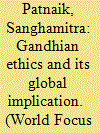

|
|
|
|
|
| Publication |
2014.
|
| Summary/Abstract |
Politics is the most crucial human activity that involves governance. Ethics is the set of principles those regulate the activity of governance and administration. Before we focus on Gandhian Ethics it is necessary to focus on the two schools of thought - Idealism and Realism. Idealism was an approach to international politics based upon liberal assumptions and principles. lt was optimistic as it envisioned a world.in which law, institutions and diplomacy replaced power, competition and use of force. This School was represented 'by St. Simon, Richard Cobden. Aldous Huxley, Russell, Mahatma Gandhi, Wilson and Margaret Mead. It gave emphasis on the role of education and international institutions to bring a better world. It focused on the Positive side of human nature. It proceeded with the assumption that the harmony of the interests was not impossible. Hans J. Morgenthau is the main exponent of realist theory. For him the central focus of realism was power. He de?ned power as "man's control over the minds and actions of other man"(Morgenthau,l993). He emphasized on: lnevitability of conflict among nations, Centrality of Power, Ever -present threat of war.
|
|
|
|
|
|
|
|
|
|
|
|
|
|
|
|
| 2 |
ID:
155501
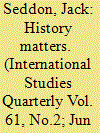

|
|
|
|
|
| Summary/Abstract |
A central point of disagreement animates global governance research. Some scholars see changing forms of global governance as eroding the power of the state. Others reject this claim, arguing that relative state power remains the most important factor in international affairs. I contend that analytical misconception confounds and misleads this debate. Both sides insist on modeling the state as a unitary actor; further, both neglect the temporal dynamics of international regime formation. I build an analytical framework that focuses on political processes that unfold over time and opens up the unitary state. Probing three decades of innovation in global finance, trade, and environmental governance, I find no evidence of a zero-sum relationship. In fact, experimental forms of transnational governance often empower governmental actors and state agencies. However, I also conclude that relative organizational power grounded in historical processes of regime formation matters more than relative state power in shaping global regulatory change.
|
|
|
|
|
|
|
|
|
|
|
|
|
|
|
|
| 3 |
ID:
120854
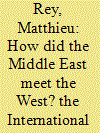

|
|
|
|
|
| Publication |
2013.
|
| Summary/Abstract |
In 1949, the United Nations sent its first mission to the Middle East in order to provide help to Palestinian refugees. This was the first step towards a development policy from this international institution. Analyses of the Iraqi (1952) and the Syrian (1955) missions can help an understanding of how Middle Eastern countries were involved in the work of the new international organization. Indeed, these investigations testify to a new policy to improve economic and social conditions in the Middle East. This research points out interactions between national institutions, local personalities and international institution in order to give an idea about the methods of communication between the Middle East and the providers of United Nations assistance.
|
|
|
|
|
|
|
|
|
|
|
|
|
|
|
|
| 4 |
ID:
074188
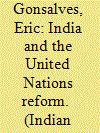

|
|
|
| 5 |
ID:
174738
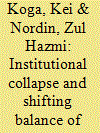

|
|
|
|
|
| Summary/Abstract |
This article examines the causal process of the institutional collapse of the Asia Pacific Council (ASPAC) in 1973 by focusing on Malaysia’s foreign policy behavior, and highlights implications for today’s ASEAN. Specifically, it argues that the institutional collapse of ASPAC was caused by Malaysia’s withdrawal, which stemmed from a shift in its balance of ontological security from security dependence on the UK and the West to greater political autonomy in Southeast Asia. This occurred after a change in the regional distribution of power caused by the UKs withdrawal from East of Suez, and to a lesser extent, US disengagement from Southeast Asia. In the 1960s and 1970s, Malaysia demonstrated the conflicting duality of ontological security, consisting of strategic and aspirational identities. Malaysia’s strategic identity was its association with the West, particularly the UK, which was nurtured through Malaysia’s routinized strategic interaction with them in the security realm. This identity prevented Malaysia from easily or completely abandoning its security ties with them, even when the strategic benefit was significantly marginal. On the other hand, Malaysia’s aspirational identity was to attain greater political autonomy without external interventions, particularly from great powers, which Malaysia experienced during its colonial period. Such sentiments emerged at the end of World War II and the following decolonization process, and were partly illustrated by Malaysia’s pursuit of the non-aligned movement.
|
|
|
|
|
|
|
|
|
|
|
|
|
|
|
|
| 6 |
ID:
084825
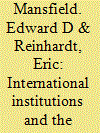

|
|
|
|
|
| Publication |
2008.
|
| Summary/Abstract |
During the past half-century, states have established a large number of international trade institutions, both multilateral and regional in scope. The existing literature on this topic emphasizes that these agreements are chiefly designed to liberalize and increase the flow of overseas commerce. Yet such institutions have another function that has been largely ignored by researchers, namely, reducing volatility in trade policy and trade flows. Exposure to global markets increases the vulnerability of a country's output to terms of trade shocks. Governments seek to insulate their economies from such instability through membership in international trade institutions, particularly the World Trade Organization (WTO) and preferential trading arrangements (PTAs). We hypothesize that these institutions reduce the volatility of overseas commerce. We further hypothesize that, because market actors prefer price stability, trade institutions increase the volume of foreign commerce by reducing trade variability. This article conducts the first large-scale, multivariate statistical tests of these two hypotheses, using annual data on exports for all pairs of countries from 1951 through 2001. The tests provide strong support for our arguments. PTAs and the WTO regime significantly reduce export volatility. In so doing, these institutions also increase export levels.
|
|
|
|
|
|
|
|
|
|
|
|
|
|
|
|
| 7 |
ID:
115311
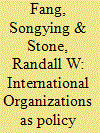

|
|
|
|
|
| Publication |
2012.
|
| Summary/Abstract |
How can international organizations persuade governments to adopt policy recommendations that are based on private information when their interests conflict? We develop a game-theoretic model of persuasion that applies regardless of regime type and does not rely on the existence of domestic constituency constraints. In the model, an international organization (IO) and a domestic expert have private information about a crisis, but their preferences diverge from those of the government, which must choose whether to delegate decision making to the expert. Persuasion can take place if the international institution is able to send a credible signal. We find that this can take place only if the preferences of the IO and the domestic expert diverge and the institution holds the more moderate policy position. This result contrasts with conventional wisdom, which holds that the necessary condition for IOs to exert influence is support from a domestic constituency with aligned preferences. Our model suggests that, far from being an obstacle to international cooperation, polarized domestic politics may be a necessary condition for IOs to exert effective influence.
|
|
|
|
|
|
|
|
|
|
|
|
|
|
|
|
| 8 |
ID:
130997
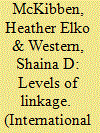

|
|
|
|
|
| Publication |
2014.
|
| Summary/Abstract |
Decisions in international institutions such as the European Union (EU) are often made by consensus, even when it is not required. Tit-for-tat exchanges provide an explanation for this phenomenon, as such exchanges can help to build up support for agreements states might otherwise not have had an incentive to support. Tit-for-tat exchanges are typically analyzed as trades of support across agreements. However, we argue that the priority of negotiators to further their national and bureaucratic interests makes exchanges across micro-level issues within a single proposal for agreement more prevalent than exchanges across agreements. Using both qualitative and quantitative analyses, we show that such within-agreement, rather than cross-agreement, linkages are related to an increased likelihood of consensus across an array of different EU agreements. To understand consensus in international institutions, more broadly, it is therefore necessary to look at the substantive issues at stake within each agreement
|
|
|
|
|
|
|
|
|
|
|
|
|
|
|
|
| 9 |
ID:
092175
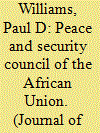

|
|
|
|
|
| Publication |
2009.
|
| Summary/Abstract |
How has the Peace and Security Council (PSC) of the African Union helped promote peace, security and stability on the African continent? This article assesses the PSC's activities in light of insights generated by the literature on international security institutions. After providing an overview of the immediate origins of the PSC, it discusses five elements of the Council's institutional design. It then evaluates the PSC's activities during its first five years (2004-9), by examining the Council's political relevance, its efficiency and productivity, and whether it is the institution best placed to deal with the continent's security problems. It concludes that the PSC's future will hinge on whether more of the African Union's members can be persuaded to devote more serious levels of resources (human and financial) to it.
|
|
|
|
|
|
|
|
|
|
|
|
|
|
|
|
| 10 |
ID:
126583
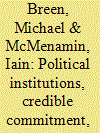

|
|
|
|
|
| Publication |
2013.
|
| Summary/Abstract |
This article tests systematically the effect of political structures on the credibility of sovereign debtors in advanced economies. It argues that power-sharing and party system polarization have important effects on long-term interest rates. Where collective responsibility is high and polarization is low, the market perceives a more credible commitment on the part of sovereign debtors. These arguments derived from the theory of credible commitments perform much better than alternative accounts of the politics of sovereign debt, namely a market preference for right-wing governments and more flexible polities. The principal data consist of a panel of 23 rich countries between 1970 and 2009. There are tests for robustness to a wider sample and a variety of different measurements.
|
|
|
|
|
|
|
|
|
|
|
|
|
|
|
|
| 11 |
ID:
080746
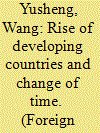

|
|
|
|
|
|
|
|